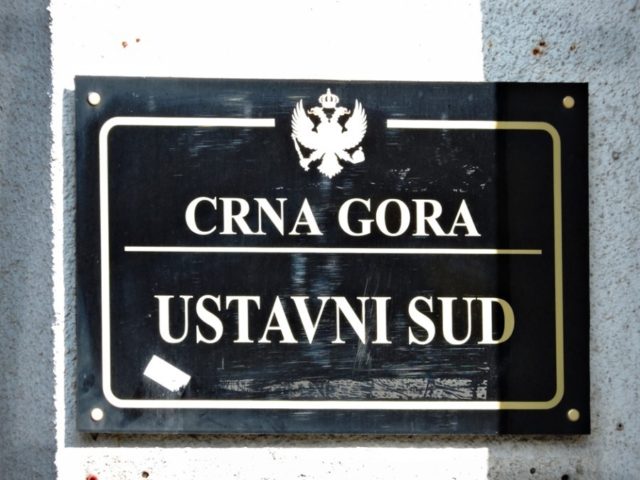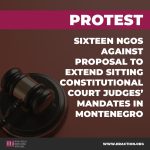- HRA kontakt
- Tel: +382 20 232 348
- hra@t-com.me
ELECTION OF JUDGES OF THE CONSTITUTIONAL COURT IS PROOF OF THE LEGITIMACY OF THE STATE

The beginning of the trial for extorting testimony from Marko Boljević has been postponed for the third time: Defence is requesting the exclusion of the Basic State Prosecutor in Podgorica
28/11/2022
31 YEARS SINCE THE AGGRESSION OF THE JNA ON THE AREA OF DUBROVNIK AND THE SHELLING OF THE OLD TOWN
07/12/2022ELECTION OF JUDGES OF THE CONSTITUTIONAL COURT IS PROOF OF THE LEGITIMACY OF THE STATE

The Human Rights Action calls on people’s deputies to elect judges of the Constitutional Court without delay. Montenegro must ensure the functioning of the body that is key for the functioning of the legal order, without which there is no rule of law, no legitimacy of the state and no membership in the EU, despite the fact that three quarters of the citizens want it.
The National Assembly of Montenegro has failed to elect new judges of the Constitutional Court for more than two years now. The work of this Court has been blocked since mid-September 2022, as the number of its judges decreased from 7 to three. If DPS, SDP, SD and LP persist in boycotting the proposed candidates, the fifth competition will fail too.
Unfortunately, local elections have already been carried out without the functioning Constitutional Court, although – according to the Constitution and the law – it is precisely this state body that guarantees their legitimacy. The municipality of Budva announced the final election results unconstitutionally and illegally, as if the Constitutional Court were something that can be given up just like that. The next elections for the president of the country, which have to be called no later than by 20 January 2023 (Article 2 of the Law on the Election of the President of Montenegro), must not be held without the functioning Constitutional Court.
The election of only one judge will not solve the problem. The Constitutional Court could formally work, but decisions could only be made if all four judges agreed thereon (“The Constitutional Court decides by majority vote of all judges”, as per Article 151, paragraph 1 of the Constitution of Montenegro). They could decide on election appeals, but for any decision to be made, everyone would have to agree whether to accept, reject or refuse the appeal. Otherwise, the situation would remain the same as before. So the election of one judge is formally satisfactory, but in reality it is not. In order for the Court to be able to decide in a regular fashion, it is necessary to elect all four candidates.
The public was not provided with a single argument against the expertise or credibility of any of the four candidates (male and female) who received the majority of votes at the session of the committee, and on whom the Assembly should now decide. During the interviews in the parliamentary committee, none of them were challenged and none were brought into question in any way. Consequently, even the members of the opposition DPS, who had refused to vote for them, praised their professional biographies and experience.
Candidates Jelena Ružičić and Snezana Armenko applied for the competition for the election of judges of the Constitutional Court for the first time. However, the National Assembly of Montenegro has previously voted on both of them. In 2006, the Assembly elected Mrs. Ružičić as a judge of the Basic Court in Nikšić, which had to include the votes of the parties in power led by the DPS, while Mrs. Armenko was elected in July 2020 as Deputy Protector of Human Rights and Freedoms, by the votes of all the deputies who were present (44). At that time, all present deputies from the DPS, the SDP and the LP voted for her. Twenty one of them are still deputies.
Candidate Jadranka Novaković, long-time head of the Constitutional Court’s Department for Constitutional Appeals, applied for the position of judge of the Constitutional Court for the third time, while candidate Dr. Ilija Vukčević applied for the second time. The voting analysis shows that the people’s deputies voted differently on them in different elections, just like they did regarding some other applicants (see a more detailed analysis here). Thus, the first time Mrs. Novaković received four votes from the DF and the SNP, while the Democrats and URA abstained (the opposition parties boycotted the work of the Assembly). The second time she received one vote from the SNP, and the third time she received 7 votes from all the parties in power. The candidate Vukčević initially received four votes, including the vote of the deputy from the opposition Liberal Party, in addition to the votes of the Democrats and the SNP, while in the second competition he received the support of all the parties in power, with the exception of the LP.
From the available professional biographies, it follows that all four candidates indisputably possess expert knowledge: one male candidate is a doctor of legal sciences who teaches at the university, all three female candidates have passed the bar examination, two of them have spent more than a year (as regular court judges) working at the European Court of Human Rights and became national lecturers on the European Convention on Human Rights, the third female candidate has been the head of the Department for Constitutional Appeals in the Constitutional Court for 10 years, where she had been an advisor for 15. Judging by their references, all proposed candidates should be able to make a well-founded contribution to the development of the practice of the Constitutional Court.







 English
English